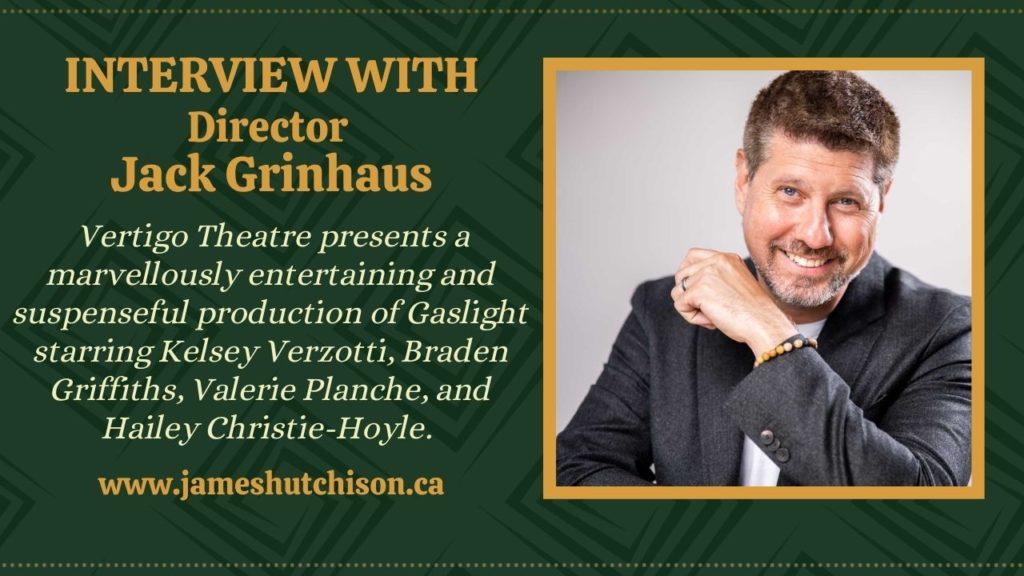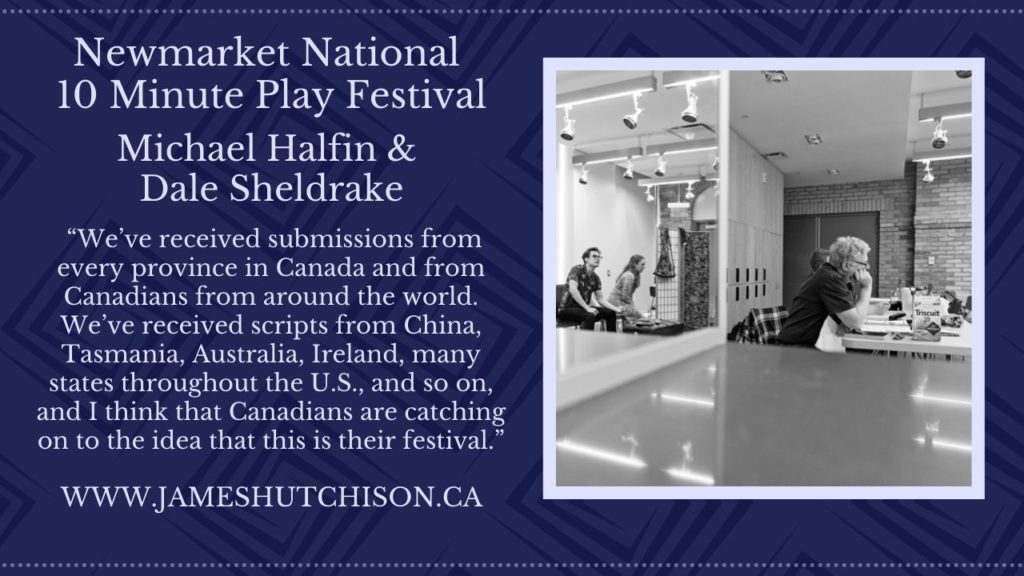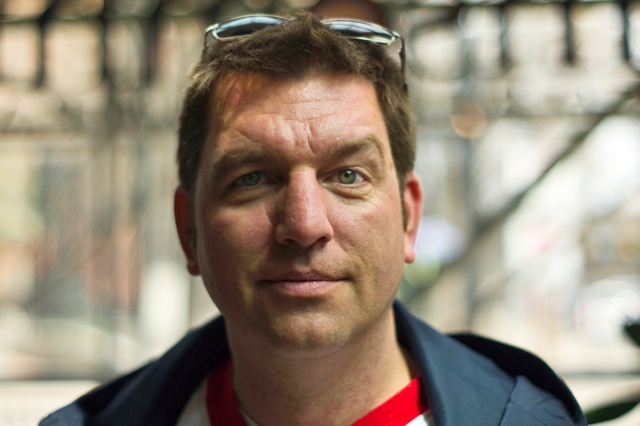
“There’s an artistic epiphany in my play John Doe Jack Rabbit. There’s a moment where the TV’s broken and they’re stuck in this cabin and they’re on the lam and this one guy Gordy is reading a book – it’s this trashy horrible romance novel called Ravaged at Rush Hour. But then he gets so sucked into this book – as if he’s never read a book before – and he has this moment where he’s like, the person who wrote this book wrote it down so I would know what it feels like to be Jessica in the cab or whatever it was, right? And that was one of those things. That’s what playwriting is about. What art is about. This is what it’s like to feel like I feel, and I put it into this painting for you to grasp that concept, or I put it in this play for you to go – wow that’s what’s going on in your head.” Neil Fleming
***
Neil Fleming is a multi-talented, award winning Calgary designer, playwright and television producer. In our hour and a half chat last Friday Neil and I talked about all kinds of things including playwriting, depression, Chuck Wendig, poltergeists and ADHD. The purpose of our getting together was to talk about Neil’s playwriting and specifically his current play, Spare Parts, which is being workshopped at the Stage One Festival of New Canadian Work at Lunchbox Theatre this week.
JAMES HUTCHISON
As a writer we spend long hours alone at the writing desk and sometimes we find ourselves facing internal or external resistance to a particular writing project or even our own writing career. Who in your life gives you the support and feedback you need that lets you continue on your journey?
NEIL FLEMING
Well my first sounding board has always been Jane, my wife. When I’m done a draft, I’ll be like, can you take a second to read this? And bless her, she’ll drop everything and go in the other room and I’ll sit there and listen to her while I’m trying to distract myself, but really I’m listening to her reading it and asking her what she’s laughing at if she’s laughing just to make sure she’s not laughing at an inside joke between the two of us that I intended for a larger group.
JAMES
Are you more nervous giving her the first draft to read, do you think, than when it’s ready for an audience?
NEIL
No, I don’t think so. I trust her. We have similar taste in story and content, but she likes things that are a bit darker than I do.
JAMES
And you’re pretty dark at times.
NEIL
I can be. But I think humour has always been a defense mechanism for me. It’s my way of not going to the dark place. More recently I’ve been trying to challenge myself to have something to say and not just be silly.
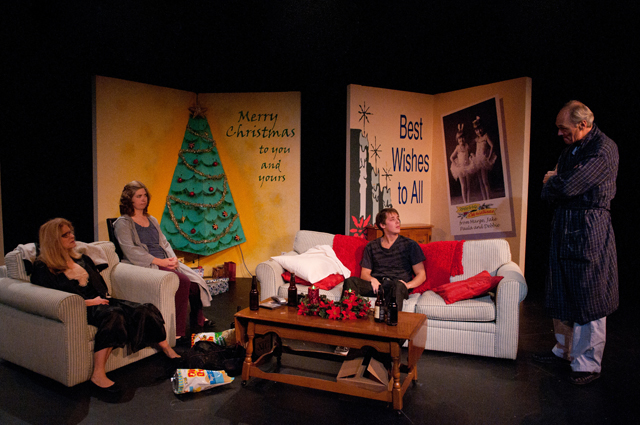
JAMES
But when you did Last Christmas that was dealing with someone dying of cancer. It was a comedy and a Christmas show.
NEIL
Sure. Pam Halstead at Lunchbox had commissioned me to write that. She wanted it to be a dysfunctional family at Christmas made up of people’s Christmas horror stories. So, there’s some Pam Halstead in it. The inflatable husband. One of her siblings bought her an inflatable husband one Christmas, and she opened it in front of everyone, and it was horrible and awful and fun but real, right?
I tried to come up with a family that didn’t resemble my own and didn’t resemble my wife’s where I could use details from real people but no one was able to accuse me of writing about my brother-in-law or whatever. They were fictional characters, but then so many people came up to me after the show because those characters resonated so strongly, and they’d say, “Oh that’s like my sister-in-law, and I can’t believe she’s in your play.”
JAMES
So, it touched on some universal characteristics.
NEIL
For sure. What I like to do is find little bits of truth and craft around those. Last Christmas started because one of my wife’s best friends worked at a dispensary in Vancouver, and her job was to teach old people how to roll a joint because they’d been given medicinal marijuana with a prescription, and they’d never smoked a joint before. And that’s just such an awesome image. So, I wanted the pot smoking grandpa. I just thought what a great start.
JAMES
And then there’s a lovely part of that play where the grandson and the grandfather have a bonding experience. Where they’re sharing the marijuana.
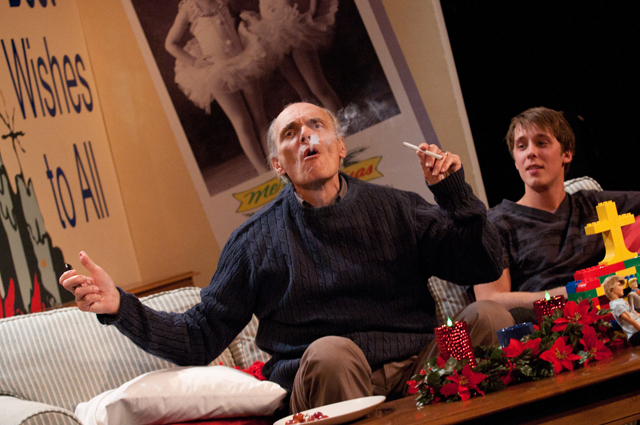
NEIL
I think that’s a favourite moment for the audience. It’s Christmas Eve, and the grandfather and the grandson are listening to Nat King Cole, and grandpa is experiencing being high for the first time. But they’re just having one of those philosophical conversations.
I love the absurdity of real things. One of my favourite things to do when I was looking for something fresh or new is I’d go to the news of the weird, and I have a play called Gnomes about garden gnomes and literally there was a news article about the Garden Gnome Liberation Front, I think, in Paris and they had broken into a garden show, and they stole all these antique gnomes, and then in the town square spelled out, Free the Gnomes with the gnomes.
And so, my concept for that play was there were three characters. Character one was a collector, and his parents had this massive collection of gnomes, and there was an incident where somebody came and smashed a bunch of them. And then here’s a woman from The Garden Gnome Liberation Society. I changed that. And then the last guy was from a group called DAMAGE which was defending all mankind against gnome evil, because he believed that gnomes were secretly evil, and that they come to life. And so, it became this argument between the three characters – were gnomes good, or evil, or ceramic?
JAMES
The new play you’re working on with Lunchbox Theatre is called Spare Parts and has three characters. There’s Martin a widower living alone in the haunted apartment his wife Sarah convinced him to buy, and on the anniversary of the accidental death of his wife and daughter Emily, Martin decides to take an overdose of anti-depressants.
Then there’s Eric, Martin’s upstairs neighbour, and a former human guinea pig for pharmaceutical companies, who is now developing and promoting a new Life Style System that focuses on exercise, recreation, and meditation through colouring as a pathway to an enjoyable life.
And finally, there’s Sarah, Martin’s dead wife. As Martin trips through his various symptoms, side-effects, and visions, we meet Sarah as a memory. In life, Sarah had a business taking people on tours of haunted buildings. She knew the story of Lester – who had been found dead in a heritage building – presumably payback for a romantic tryst. When she heard the apartment was coming on the market, she knew she had to convince Martin to buy it and move in. These three characters…
NEIL
Well, four if you count Lester.
JAMES
Four characters are caught up in a story about suicide, depression, guilt, religion, and the supernatural. First question, how much of that is based on personal experience?
NEIL
Well I didn’t know this at the time, but I did struggle with anxiety and depression. It was more anxiety, I think. Depression I didn’t know how to define. I didn’t know anything about mental health really. Depression to me was sadness, as a writer. As a clinical term it’s something else. What I was struggling with was my inability to focus and accomplish things and constantly feeling like I was getting lapped by younger writers or whatever. I was like why can’t I get anything done?
Recently I’ve been diagnosed with ADHD and it was such a relief to finally know what I’ve been struggling with my entire life really. But, before I was diagnosed I was buying a book by Peter Shankman called Crazy Publicity Stunts and Why Your Company Should Do Them because I was thinking of doing a street theatre project that was sort of a social media experiment. And beside that book, in the people who bought this book also bought section, was another book by Peter Shankman called, Faster Than Normal. How to hack your ADHD brain and unleash your super power. And I was like, I want to read that. I ordered both of them. And that book explained my entire life, my entire history, and I was like Oh, my God. That’s my childhood. This is high school. University. All of those things, and I could see how things went sideways
And when you’re a writer and you sit down to write something it’s work. The first draft is always fun, but fixing it and fine tuning it that’s work, and if nobody’s breathing down your neck waiting for a draft then it’s easy to just let that one sit there and start something new. So, I have a lot of different projects that haven’t seen the light of day because I haven’t been able to focus. I started Spare Parts years ago, and it was part of my mental health journey.
The other thing with ADHD is that when I need to focus I can hyper focus. That’s the H part. As an adult it’s not hyper activity it’s impulse control. And so, yesterday I was writing solid for five to six hours on the play because I have to give them something to read by Monday so we can start to work on it.
JAMES
Who are you working with.
NEIL
Col Cseke is the director. Graham Percy is playing Martin. Matt McKinny is Eric, and Julie Orton is Sarah. And some things have changed already from your introduction. I’ve cut the daughter. They rent the place they don’t buy it. I know I’ve made that note before about Eric being a Guinee pig so he knows what the prescription is and what it does, because I need somebody in there to help detail what’s going on for the audience because your brain is a complex machine. That’s what fascinated me about this idea in the first place, because when I was struggling with those anxiety issues I talked to my doctor about it – this was years ago – and she gave me a trial prescription of Escitalopram which is a serotonin inhibitor in a way. And when I got the pills they came with warnings.
JAMES
The side effects?
NEIL
It was a crazy.
JAMES
Scary list?
NEIL
It’s supposed to help you, but like how could it maybe do that to you.
JAMES
Do the exact opposite.
NEIL
Well if you have suicidal tendencies it could amplify that.
JAMES
That’s frightening.
NEIL
Yeah, and I’m like, do I want to take this, and so you know I decided at the time I don’t think this is for me. But I kept the information and that’s what started it.
JAMES
That’s what started this play six or seven years ago?
NEIL
More than that – I think, 2007 is what my hard drive tells me was a first draft. So, I’ve learned a lot in the last eight or nine years. Mostly in the last year. What’s always interested me as a writer are the odd outlying people. Spare Parts is kind of about that. It’s about people just on the outskirts of regular society. Like the neighbor, Eric’s character. He’s trying to rediscover his purpose by starting this sort of life style system.
JAMES
It’s kind of a religion he’s working on?
NEIL
It’s open to all religions, because in his theory religion is part of the problem because of people bickering over the differences between theirs, and yours, and whatever.
JAMES
So, his philosophy could be placed over any faith?
NEIL
Yeah, his philosophy of life is to find the things that make you feel good because you’re only here for a finite amount of time.
JAMES
What are you hoping to accomplish in next week’s workshop?
NEIL
What I love about playwriting is it’s all about questions. Dramaturgy is all about questions, hopefully. And I don’t mind suggestions, but questions are great because I will write them all down, because a question from anyone – whether it’s from an actor, or a stage manager, or an audience member, represents a certain percentage of that population. There’s a lot more people who will have that same question. I lost you for two or three lines because you were hung up on something, so I always feel like you have to address those with what’s the simplest way for me to make that question go away. If it’s that kind of question.
I was just reading this book, Damn Fine Story, by Chuck Wendig who’s a novelist and a writing blogger. Terrible Minds is his blog. In his book, which is about story telling more than anything else, he uses Die Hard as an example. And at the root of it he says stories are about characters. Stories are rooted in character, and so a character has a problem, and then how they try to solve that problem is the story.
JAMES
And they either solve it, or they don’t.
NEIL
But what he pointed out – Bruce Willis’s character’s problem, John McClain – I only know that because he keeps referring to him in this book, but his problem is that his wife left him for this job in LA, and he’s a New York City cop, so he’s flown out at Christmas time to convince her to come home to get his family back together. And coincidentally all of this stuff goes down with Alan Rickman, and terrorists, and the tower, and him not having his shoes on – those are all coincidental pieces of the puzzle of I’m just trying to get back together here with my wife.
JAMES
And that’s what makes it work – the human element. You mentioned something in a previous interview when you were asked, “What do you think art is?” You said, “I suppose art is an expression of human emotion.” Why do you think we have this need to examine our emotional connection and reaction to other people, the world, and ourselves?
NEIL
I think that there are so many unanswered questions that we have. You know I took first year philosophy when I was at University and it was all Plato’s Republic and you couldn’t make me read that book – it was like painful. If it had been a survey course of all the philosophers I think I would have really gotten into it with different perspectives and stuff.
JAMES
Maybe theatre is philosophy on stage?
NEIL
Yeah, kind of. It’s trying to explain what it means to be a person, because we don’t know what happens after we die. As artists I think we’re always trying to reflect back, and sometimes it’s a fun house mirror reflection, but you know it’s also a compulsion. And I think the ADD is part of it too. I just started doing collage work with my photography. A few years ago we were in Paris for my wife’s 50th birthday and I saw all these numbers every where, and I just started taking pictures of numbers – like address numbers and here and there, and I bought one of those big cheap print things for ten bucks form Homesense or whatever, and I pasted all of these photographs over top of it as a present for my wife, and here’s our entire Paris trip on one canvas, and you could see us in some of them, and some of the pictures were tiny, and I have no idea the compulsion that drove me to do that, but it felt like something I needed to do.
JAMES
It tells a story.
NEIL
Yeah, for sure and it’s something you can spend some time with it’s not just like, “Oh yeah, I’ve seen that.” You can really sort of dive in and look at all those little details
JAMES
Do you think that’s what your plays are like? Like in terms of your process it reflects what you’re doing with your photography, because you’ve got all these different ideas, all these little bits, and now you’re putting them together, and the play itself when the audience comes to it is the experience of all these little pieces.
NEIL
Yes, and the takeaway will be different for everyone, you know, I think. Especially with this. There’s so much crazy content in this play. There’s an artistic epiphany in my play John Doe Jack Rabbit. There’s a moment where the TV’s broken and they’re stuck in this cabin they’re on the lam and this one guy Gordy is reading a book – it’s this trashy horrible romance novel called Ravaged at Rush Hour. But then he gets so sucked into this book – as if he’s never read a book before – and he has this moment where he’s like, the person who wrote this book wrote it down so I would know what it feels like to be Jessica in the cab or whatever it was, right? And that was one of those things. That’s what playwriting is about. What art is about. This is what it’s like to feel like I feel, and I put it into this painting for you to grasp that concept, or I put it in this play for you to go – wow that’s what’s going on in your head.
***
Spare Parts is one of eight new plays being developed through The Stage One Festival of New Canadian Work at Lunchbox Theatre from May 25th to June 9th.
2018 Stage One Festival of New Canadian Work Free Reading Schedule
Spare Parts by Neil Fleming – Friday, May 25, 12:00PM
The Happiness Equation by Peter Fenton & Scott White – Friday, May 25, 6:00 PM
The Art of Kneading by Helen Knight – Saturday, May 26, 12:00 PM
Paul’s Grace by Anna Cummer – Friday, June 1, 12:00 PM
Candemic by Arun Lakra – Friday, June 1, 6:00 PM
Wo De Ming Shi Zhang Xin En by Kris Vanessa Teo – Saturday, June 2, 12:00 PM
Go for Gold, Audrey Pham by Camille Pavlenko – Friday, June 8, 12:00 PM
Reprise by Mike Czuba – Saturday, June 9, 12:00 PM
This interview has been edited for length and condensed for clarity.
